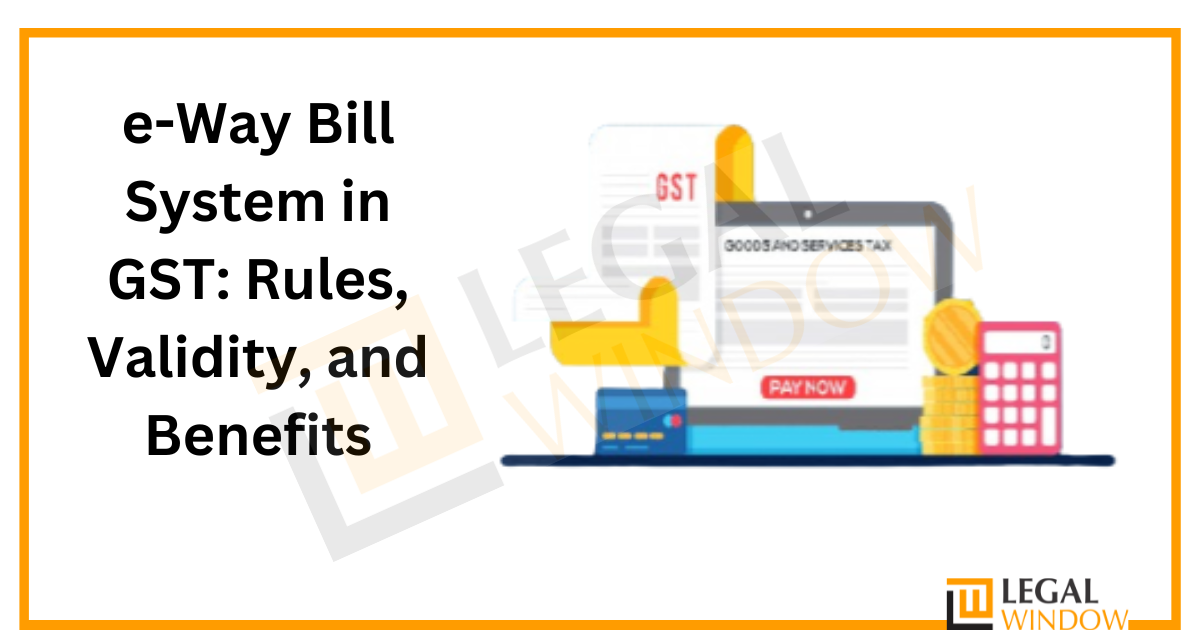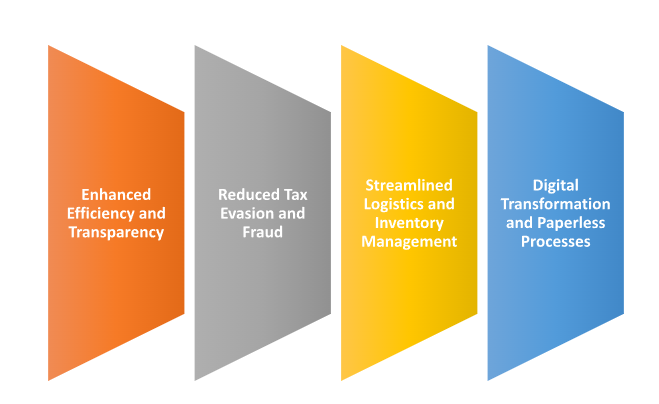
The GST is an indirect tax that replaced multiple state and central taxes in India. The successful implementation of GST enhances the government to introduce the e-Way Bill System-GST, aimed at streamlining the movement of goods across state borders. The e-Way Bill System was introduced to improve transparency, reduce tax evasion, and make the transportation of goods more efficient and hassle-free. This article deals with the e-Way Bill System in GST, its rules, validity, and benefits.
Contents
What is the e-Way Bill System in GST?
- Definition and Purpose
The e-Way Bill System is an electronic document generated online for the movement of goods exceeding a certain threshold value. It is mandatory for inter-state and intra-state transportation of goods, intended to ensure the validity and legitimacy of the transportation. The e-Way Bill System-GST enhances the monitoring and tracking of goods to reduce tax evasion and promote compliance.
- Generation and Validity
In e-Way Bill generation, the registered supplier or the recipient of goods needs to provide relevant information, such as invoice details, transportation details, and transporter details. Once generated, the e-Way Bill contains a unique e-Way Bill number (EBN) and is valid for a specified period, which varies based on the distance travelled by the goods. The e-way bill validity check is very important after its generation.
Rules of the e-Way Bill System in GST
- Responsibility of the Registered Person
The registered supplier or recipient of goods is responsible for generating the e-Way Bill before the transportation of goods. They must ensure accurate information, including the invoice details, is provided to generate a valid e-Way Bill. If the transporter finds any discrepancies, they can reject the e-Way Bill.
- Consignee and Consignor
The e-Way Bill must be generated by the registered person in the case of the consignee or consignor supplying the goods. If the transportation is undertaken by the transporter, it is the transporter's responsibility to generate the e-Way Bill.
- Documentation and Verification
During transportation, the person in charge of the conveyance must carry the invoice or bill of supply, delivery challan, and a copy of the e-Way Bill or the e-Way Bill number. Those documents need to be checked or verified by tax officials if needed. If any failure occurs to provide the essential documents, may result in penalties and delays.
- Updation and Cancellation
If the goods are not transported or do not reach the destination, the e-Way Bill can be cancelled or updated accordingly. Changes in the e-Way Bill due to vehicle breakdown or other unforeseen circumstances are also permitted.
Validity of e-Way Bill
- Distance-based Validity
The validity of the e-Way Bill is determined based on the distance travelled by the goods. For example:
- For distances up to 100 km, the validity is 1 day.
- For distances between 100 km and 300 km, the validity is 3 days.
- For each additional 100 km or part thereof, an additional day is granted.
- Extension of Validity
In certain circumstances, such as unforeseen obstacles or natural calamities, the validity of the e-Way Bill can be extended. However, this extension must be requested before the expiry of the original validity period.
Benefits of the e-Way Bill System in GST

- Enhanced Efficiency and Transparency
The e-Way Bill System enables seamless generation and tracking of bills, making the movement of goods more efficient and transparent. It eliminates the need for physical documentation, reduces paperwork, and facilitates faster verification at checkpoints, resulting in time and cost savings.
- Reduced Tax Evasion and Fraud
By integrating the e-Way Bill System with the GST portal, the government can monitor the movement of goods in real time. This curbs tax evasion and prevents the issuance of fake invoices, ultimately enhancing overall tax compliance and revenue collection.
- Streamlined Logistics and Inventory Management
The e-Way Bill System provides businesses with accurate data on the movement of goods, enabling better logistics planning and inventory management. It helps optimize supply chains, minimize transit delays, reduce warehousing costs, and improve overall operational efficiency.
- Digital Transformation and Paperless Processes
This Bill System is a vital step towards digitalization and paperless processes. Businesses can save time and resources by generating e-Way Bills electronically and avoiding manual paperwork. This aligns with the government's vision of a digital and cashless economy.
End Note
In the sector of GST, e-Way Bill System is a significant development in the field of goods transportation and compliance. It ensures the seamless movement of goods, enhances transparency, reduces tax evasion, and promotes overall efficiency in the logistics sector.
In case of any query regarding the e-Way Bill System GST: Rules, Validity, and Benefits feel free to connect with our legal experts at Legal Window at 72407-51000.
Company Secretary and diligent learner deeply immersed in the world of corporate law, compliance, and governance with a focus on developing a robust foundation in legal principles and corporate practices. Passionate about exploring the intricacies of company law, regulatory compliance, and corporate governance.
Categories
- Agreement Drafting (23)
- Annual Compliance (13)
- Change in Business (37)
- Company Law (150)
- Compliance (90)
- Digital Banking (3)
- Drug License (4)
- FEMA (17)
- Finance Company (42)
- Foreign Taxation (9)
- FSSAI License/Registration (15)
- GST (124)
- Hallmark Registration (1)
- Income Tax (214)
- Latest News (36)
- Miscellaneous (170)
- NBFC Registration (8)
- NGO (18)
- SEBI Registration (6)
- Section 8 Company (10)
- Start and manage a business (27)
- Startup/ Registration (134)
- Trademark Registration/IPR (48)
Recent Posts
- Major Upgrade: Breaking Down GST 2.0 September 15, 2025
- New Income Tax Bill 2025 August 27, 2025
- ITR-3 Form Explained: Who Should File & Step-by-Step E-Filing Guide (FY 2024-25) June 25, 2025
All Website Tags
About us
LegalWindow.in is a professional technology driven platform of multidisciplined experts like CA/CS/Lawyers spanning with an aim to provide concrete solution to individuals, start-ups and other business organisation by maximising their growth at an affordable cost.









